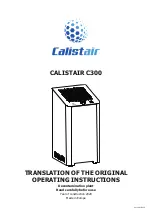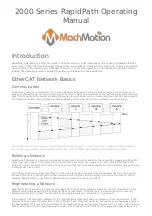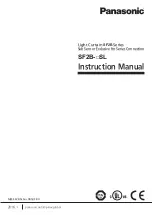
28
Aux Out Type
- Auxiliary output type sets the use for the 24VAC auxiliary output signal. If a powered exhaust is
selected for this output, it will eliminate the option to control a powered exhaust with a 0-10VDC signal.
Damper
- Setting to turn on/off damper.
Out #1 0-10VDC
-
Output #1 configures the use for OUT #1 on the “To RTU” side of the RTULink.
Out #2 0-10VDC
- Output #2 configur
es the use for OUT #2 on the “To RTU” side of the RTULink.
Out #1 Range
- Output 1 range is the voltage range that the component connected to output 1 is designed to
operate with. Once set, the RTULink will use the low-end voltage of this range for an OFF signal and the high-
end voltage of this range for a fully modulated ON signal.
Out #2 Range
- Output 2 range is the voltage range that the component connected to output 2 is designed to
operate with. Once set, the RTULink will use the low-end voltage of this range for an OFF signal and the high-
end voltage of this range for a fully modulated ON signal.
Power Exh Thrsh
- Powered exhaust threshold is the percentage open the economizer/damper must be in order
for the powered exhaust to turn on. For an ON/OFF powered exhaust, this is the threshold at which it turns on.
For a modulating powered exhaust, the speed of the exhaust will modulate linearly as the economizer/damper
opens from this threshold to fully open (100% open).
Economizer Type
- Economizer type sets the type of economizer logic that will be used. This only applies if the
RTULink will be used to control an economizer that accepts a 0-10VDC signal. This feature will control the
economizer using an output on the RTULink. If you are unaware whether or not the RTU is capable of this
feature, contact technical support.
Use Diff Econ?
- This parameter determines whether or not to use fixed or differential enthalpy. If this parameter
is set to yes, then differential economizer logic will be used, if this parameter is set to no, then fixed economizer
logic will be used. View
for enthalpy economizer operation and logic.
Dry Bulb Band
- Dry bulb band is the modulation band for the dry bulb economizer in degrees Fahrenheit. View
for dry bulb economizer operation and logic.
Enthalpy Band
- Enthalpy band is the modulation band for the enthalpy economizer in BTU per pound (btu/lb).
for enthalpy economizer operation and logic.
Econ Temp SP
- Enthalpy temperature set point is the temperature set point in degrees Fahrenheit for the
enthalpy economizer. View
for enthalpy economizer operation and logic.
Econ RH SP
- Economizer relative humidity set point is the relative humidity set point (%) for the enthalpy
economizer. View
for enthalpy economizer operation and logic.
Econ Cool Disbl
- Economizer cool disable is the percentage open the economizer/OA damper must be in order
for mechanical cooling to be disabled. View
for economizer operation and logic.
Min OA Damper %
- Minimum outside air damper percentage is the percent open the damper will be during
occupied times. During unoccupied times, the damper will close completely for energy conservation. The
RTULink occupancy schedule defaults to occupied, so once this is set, the damper will open to a minimum
position until it receives an unoccupied schedule block from CASLink. When the RTULink loses a schedule, it
defaults to this minimum outside air damper position.
CO2 OA DCV?
- Carbon dioxide based demand control ventilation (DCV) strategy will allow a reduction of OA
when space CO
2
levels are below a threshold. This feature requires a CO
2
sensor to be installed in a space or
return that will accurately measure the CO
2
levels of the space supplied by the unit and it requires the outside air
damper to be controlled by the RTULink. The intent of this feature is to reduce energy consumption by reducing
the outside air load on the space when possible.
CO2 OA Thresh
- Carbon dioxide based threshold is the value in parts per million (ppm) that the CO
2
levels can
reach before forcing the units outside air damper is forced to fully open. This parameter is only relevant if the
CO2 OA DCV option is enabled.
Summary of Contents for RTULink
Page 2: ...2...
Page 30: ...30 Main Board HMI Menu Tree...
Page 31: ...31...
Page 32: ...32...
Page 33: ...33...
Page 34: ...34...
Page 41: ...41...
Page 42: ...42...
Page 43: ...43...
Page 44: ...44...
Page 52: ...52 APPENDIX C Fixed Dry Bulb Economizer Figure 34 Fixed Dry Bulb Economizer Operation...
Page 53: ...53 Differential Dry Bulb Economizer Figure 35 Differential Dry Bulb Economizer Operation...
Page 54: ...54 Fixed Enthalpy Economizer Figure 36 Fixed Enthalpy Economizer Operation...
Page 55: ...55 Differential Enthalpy Economizer Figure 37 Differential Enthalpy Economizer Operation...
















































